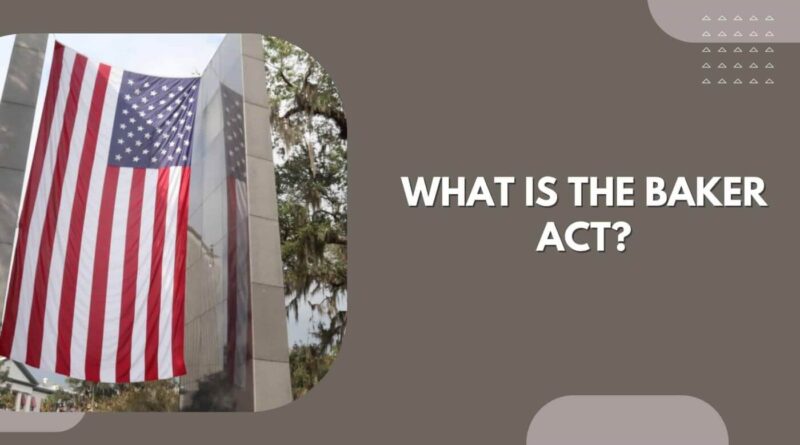The Baker Act: A Comprehensive Guide
Mental health crises can be overwhelming, both for individuals experiencing them and their loved ones. In Florida, the Baker Act is a critical legal tool designed to provide immediate help to those in need. Whether you’re seeking general information, legal guidance, or resources for a specific situation, this article covers everything you need to know about the Act, including FAQs and actionable advice.
What is the Baker Act?
The Baker Act, officially known as the Florida Mental Health Act of 1971, is a law that allows for involuntary commitment of individuals experiencing a mental health crisis. It provides a legal framework for assessing and stabilizing individuals who may pose a danger to themselves or others due to mental illness.
Baker Act Explained
The Baker Act enables law enforcement, medical professionals, or family members to initiate an involuntary psychiatric examination if a person meets specific criteria. The goal is to ensure the individual receives proper mental health care in a structured environment.
Definition
Under Florida law, the Baker Act law applies when an individual is unable to determine their need for treatment due to a mental illness and may cause harm to themselves or others. The Act allows for an involuntary psychiatric hold for up to 72 hours for evaluation.
Involuntary Commitment
Involuntary Hold
An involuntary hold under the Act means a person is placed in a psychiatric facility without their consent for an emergency mental health evaluation.
Baker Act 72-Hour Hold
During the 72-hour hold, medical professionals assess whether the individual requires further treatment. If necessary, the person may either be released, voluntarily admitted, or petitioned for a court-ordered extended stay.
Psychiatric Hold
The psychiatric hold under the Act aims to provide immediate care and prevent self-harm or harm to others. Mental health facilities conduct assessments and determine the best course of action for treatment.
Mental Health Crisis
Act for Suicidal Individuals
The Act is often used in cases where someone exhibits suicidal tendencies. If a person expresses suicidal thoughts, behaviors, or attempts, they can be Acted to prevent self-harm.
Dangerous Behavior
If an individual is engaging in violent or unpredictable behavior due to a mental health crisis, authorities can initiate the process to ensure their safety.
Schizophrenia and Other Mental Illnesses
People with schizophrenia, bipolar disorder, and other severe mental illnesses may be acted if their condition leads to dangerous or erratic behaviors that threaten their well-being.
Legal and Procedural Aspects
Court Order
A court order can be issued if a medical professional believes a person should remain under psychiatric care beyond the 72-hour hold. The individual will then have a legal hearing to determine the next steps.
Legal Rights
Individuals Acted have legal rights, including the right to legal representation, the right to a hearing, and the right to challenge involuntary commitment.
Forms and Petitions
Rights and Advocacy Under the Baker Act
The process requires legal forms and a petition, which can be filed by doctors, law enforcement, or family members under specific circumstances.
Patient Rights
Patients have the right to:
- Be informed of their rights upon admission.
- Receive appropriate treatment.
- Consult an attorney and attend hearings.
Legal Representation and Advocacy
Legal professionals and mental health advocates help individuals understand their rights and challenge unjust involuntary commitments.
Civil Rights
Some advocacy groups argue that the Act can infringe on civil rights if misused. Knowing your rights is crucial to protecting due process.
Comparing the Baker Act to Other Laws
Marchman Act
- The Baker Act is for mental health crises.
- The Marchman Act is for substance abuse treatment.
5150 (California Law)
- The Baker Act applies in Florida.
- 5150 is a similar law in California that allows for involuntary holds.
Commitment in Other States
Each U.S. state has different laws regarding involuntary mental health commitment, often with different holding periods and requirements.
Alternatives
Alternatives to this Act include voluntary treatment, crisis intervention teams, and mental health counseling services.
Frequently Asked Questions (FAQs)
How long does the Baker Act last?
The initial Baker Act hold is 72 hours, but a court order may extend the stay if necessary.
Can you refuse a Baker Act hold?
No, a Baker Act hold is involuntary. However, individuals have legal rights and can challenge it in court.
What happens after the 72-hour Baker Act hold?
After 72 hours, a person may be:
- If no further treatment is needed, The person may be Released,.
- Voluntarily admitted for continued care.
- Subject to a court hearing for extended commitment.
Can a family member Baker Act someone?
A family member cannot directly Act someone but can petition a judge or contact law enforcement or medical professionals to begin the process.
Can minors refuse treatment under the Baker Act?
Minors have limited rights to refuse treatment. Parents and guardians are typically involved in decisions.
Find the list of Florida Colleges and Schools here. For list of Law schools in Florida, click here.
The Baker Act in Florida is a crucial law designed to protect individuals experiencing a mental health crisis. Understanding patient rights, legal procedures, and available resources ensures fair treatment and access to the necessary care. If you or a loved one is facing a mental health emergency, seeking professional guidance is the first step toward recovery.
